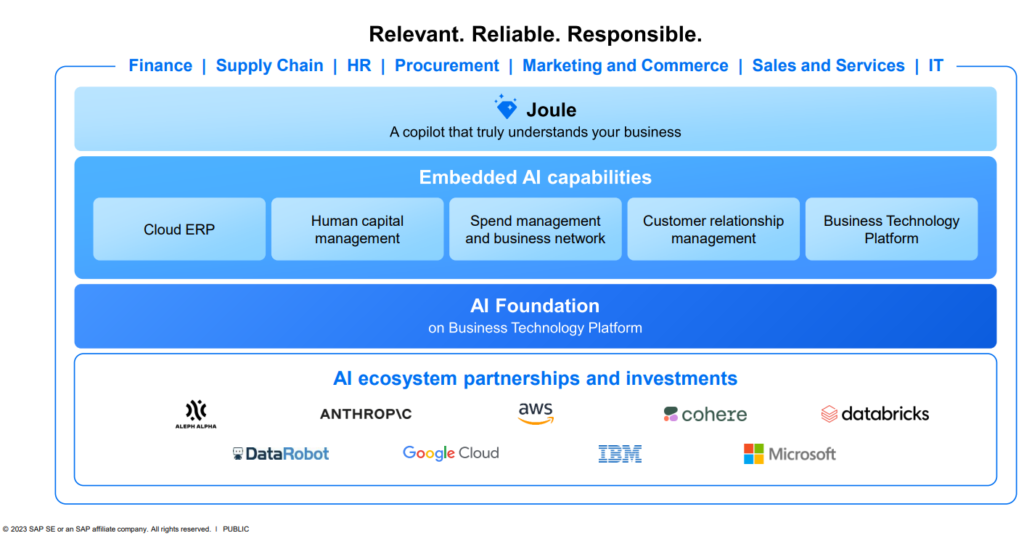
Revolutionizing Business Innovation with SAP’s Generative AI Solutions
In the rapidly evolving landscape of technology, generative artificial intelligence (AI) emerges as a transformative force, redefining the boundaries of innovation, creativity, and operational efficiency in the business world. Unlike conventional AI, which excels in understanding and interpreting data, generative AI pushes the envelope further by creating new, unprecedented content — be it text, images, or complex data patterns. This groundbreaking technology promises not just to automate routine tasks but to inspire novel solutions, forecast future trends, and catalyze the development of innovative products and services.
At the forefront of this revolution, SAP, a global leader in business process software, seamlessly integrates generative AI into its comprehensive suite of solutions, marking a new frontier for innovation across industries. By embedding AI into the core of business operations, SAP is not just enhancing existing processes but also paving the way for entirely new business models and strategies that were previously unimaginable.
This article aims to delve into the transformative impact of SAP’s generative AI technologies, particularly SAP AI Build and SAP AI Launchpad, on the business landscapes. Through exploring how these advanced tools are being leveraged by organizations worldwide, we will uncover the myriad ways in which generative AI is reshaping industries, driving efficiency, fostering innovation, and ultimately, redefining what’s possible in the realm of business. Join us as we explore the exciting journey of generative AI with SAP, and discover how businesses are harnessing this powerful technology to carve out a competitive edge in the digital age.
Understanding Generative AI
Generative AI might sound like a complex term reserved for tech enthusiasts and professionals, but its concept can be understood and appreciated by everyone. At its core, generative artificial intelligence is a branch of AI focused on creating something new and original. Unlike traditional AI, which analyzes and interprets data to make decisions or predictions, generative AI goes a step further by producing content that didn’t exist before. Imagine an artist who not only appreciates art but also creates new pieces; generative AI operates similarly, but in the realm of data, texts, images, and even sounds.
This technology is grounded in sophisticated algorithms and models, such as Generative Adversarial Networks (GANs) and transformers, that learn from vast amounts of data. Through this learning process, they can generate new data like the one they were trained on. For example, after analyzing thousands of paintings, a generative AI model could create a new artwork that resembles, yet is distinct from, the styles it learned from.
The significance of generative AI in the business world cannot be overstated. It is transforming industries by:
- Creating New Content: From generating realistic images and videos to crafting written content and even developing new product designs, generative AI can create a wide range of new materials. This capability is invaluable for industries like marketing, entertainment, and product development, offering a new tool for creativity and innovation.
- Predicting Outcomes: Generative AI can simulate various scenarios and predict their outcomes based on historical data. This is particularly useful in fields such as finance, where it can forecast market trends, or in supply chain management, where it can anticipate potential disruptions.
- Automating Processes: Beyond simple task automation, generative AI can optimize processes by generating efficient workflows, creating code for software development, or even automating the design of complex systems. This level of automation can significantly increase efficiency, reduce costs, and allow human employees to focus on more strategic activities.
In essence, generative AI represents a leap forward in how machines can assist in creative processes, decision-making, and operational efficiency. By harnessing this technology, businesses can explore new horizons of innovation, tailor their offerings more closely to customer desires, and streamline their operations in ways that were previously unimaginable.
The Business Relevance of Generative AI
The advent of generative AI has not only captured the imagination of technologists and innovators but has also commanded the attention of business leaders across various sectors. These pioneers recognize the transformative potential of generative AI, noting its ability to redefine the competitive landscape and unlock new avenues for growth and innovation.
” AI is the new electricity. Just as electricity transformed almost everything 100 years ago, today I have a hard time thinking of an industry that I don’t think AI will transform in the next several years,” says Andrew Ng, a prominent figure in the field of AI. This sentiment is echoed by IBM CEO, Ginni Rometty: ” The emergence of AI in the business world isn’t just a trend, but a pivotal shift in how companies operate, offering unprecedented opportunities for growth, personalization, and efficiency. Companies that harness the power of AI will lead in their industries.”
These reflections underscore the broad impact of generative AI across industries, as illustrated in the following generalized case studies:
Manufacturing
In the manufacturing sector, a company leveraged generative AI to revolutionize its product design process. By inputting design parameters and constraints into a generative AI model, the company could generate hundreds of optimal designs in the time it previously took to create one. This not only sped up the design phase but also resulted in more innovative and efficient product designs, reducing material costs and environmental impact.
Healthcare
A healthcare organization utilized generative AI to personalize patient treatment plans. The AI analyzed vast datasets of patient histories, treatments, and outcomes to generate customized treatment recommendations. This approach significantly improved patient outcomes by tailoring treatments to individual patient profiles, marking a departure from the one-size-fits-all strategy and towards more personalized and effective healthcare.
Finance
In the finance industry, a financial services firm employed generative AI for risk assessment and fraud detection. The AI model was trained on historical transaction data to identify patterns indicative of fraudulent activity. It could then generate models to predict future attempts at fraud, enabling the firm to preemptively address these risks. This not only safeguarded the firm’s assets and customers’ trust but also streamlined compliance processes, making them more efficient and less intrusive.
These case studies highlight the versatility and power of generative AI in transforming industries. By generating novel solutions, predicting outcomes with unprecedented accuracy, and automating complex processes, generative AI empowers businesses to innovate, optimize, and lead in their respective fields. As businesses continue to explore and integrate generative AI into their operations, the potential for transformation and growth appears limitless.

Discover our SAP consulting service
SAP and Generative AI: A Strategic Overview

In the rapidly evolving landscape of enterprise
technology, SAP has emerged as a strategic pioneer, ardently integrating
artificial intelligence (AI) into every facet of its business solutions. SAP’s
approach transcends the conventional application of technology, envisioning AI
as a cornerstone of modern business operations and decision-making. This vision
is anchored in three fundamental principles: relevance, reliability, and
responsibility, which guide the development and deployment of SAP’s AI initiatives
to ensure they are business-centric, dependable, and ethically grounded.
SAP’s AI endeavors are characterized by a deep
integration of intelligent capabilities within its suite of applications. By
embedding AI into the operational strata of Cloud ERP and Human Capital
Management, SAP enhances the analytical and predictive capabilities of these
systems. This strategic integration ensures that AI is a central component in
optimizing business processes, advancing SAP’s Cloud ERP to not just process
transactions but to also guide business strategies predictively.
In the domains of Spend Management and Customer
Relationship Management, SAP’s AI-driven insights provide a transformative
edge. Spend Management is elevated by AI to not only track expenditures but
also to uncover cost-saving opportunities and mitigate risks. Similarly,
Customer Relationship Management is reimagined with AI, empowering businesses
to deliver personalized and engaging customer experiences at scale.
At the base of SAP’s innovation lies the AI
Foundation, a robust platform within the Business Technology Platform that
fosters the creation, management, and scaling of AI applications. It serves as
a testament to SAP’s commitment to building a versatile infrastructure that
supports the seamless integration of AI, ensuring that AI-driven solutions are
built upon a strong, scalable, and agile framework.
Recognizing the expansive nature of AI, SAP
actively engages in strategic partnerships and investments, tapping into the
specialized expertise of leaders in cloud computing and AI innovation.
Collaborations with industry titans like Google Cloud, Amazon Web Services
(AWS), and Microsoft, as well as with AI-focused firms like DataRobot and
Cohere, showcase SAP’s dedication to staying at the forefront of AI technology.
These alliances are instrumental in enhancing SAP’s AI capabilities, allowing
the company to harness a diverse range of insights and technological
advancements.
SAP’s strategic emphasis on AI is a clear
indication of its role as an architect of the future business landscape. By
championing a robust, integrated, and ethically-conscious AI strategy, SAP
empowers organizations to harness the power of AI, not just as a competitive
advantage, but as a transformative force. As the digital age continues to
present new challenges and opportunities, SAP’s unwavering dedication to
integrating AI into its ecosystem stands as a beacon for businesses seeking to
transform these possibilities into tangible success. In SAP’s vision, AI is
more than a technological leap; it is the key to unlocking a new era of
enterprise agility, innovation, and growth.
Parte superior do
formulário
Empowering Industries through SAP’s AI
Capabilities
As businesses across the globe seek to navigate
the complexities of the modern market, SAP’s suite of AI tools, particularly
those leveraging generative AI, has proven instrumental in driving efficiency,
fostering innovation, and securing a competitive edge. Through a series of
generalized case studies, we’ll explore the transformative impact of SAP’s AI
solutions across various business functions, including supply chain management,
customer service, human resources (HR), and marketing.
Supply Chain Management (SCM): In the realm of SCM, a
multinational manufacturing company utilized SAP’s generative AI capabilities
to revolutionize its inventory forecasting and demand planning processes. By
integrating SAP AI Build, the company developed predictive models that accurately
forecast demand variations and optimized inventory levels across its global
network. This not only reduced waste and holding costs but also improved the
company’s responsiveness to market changes, ensuring product availability
without overstocking.
Customer Service: For a leading service provider in the
telecommunications sector, enhancing customer satisfaction while managing
operational costs was paramount. Implementing SAP’s AI Launchpad, the company
automated its customer service processes, employing generative AI to create a
sophisticated virtual assistant. This AI-powered assistant could understand and
resolve customer queries in real-time, across multiple languages and platforms,
significantly reducing response times and freeing human agents to focus on more
complex issues. The result was a notable improvement in customer satisfaction
scores and a reduction in operational costs.
Marketing: In the competitive landscape of the consumer
goods industry, a company tapped into SAP’s generative AI to enhance its
marketing strategies. Utilizing SAP AI Build, the company created a model to
generate personalized marketing content for its customers, based on their
purchasing history, preferences, and engagement across digital platforms. This
approach allowed for highly targeted campaigns that resonated with the
audience, leading to increased engagement rates, higher conversion rates, and a
boost in customer loyalty.
These case studies illustrate just a fraction
of the potential applications of SAP’s generative AI capabilities. Across
industries and functions, businesses are finding innovative ways to leverage
these tools for strategic advantage. By automating routine tasks, generating
new insights, and creating more personalized experiences, SAP’s AI solutions
are not just enhancing efficiency; they are redefining what’s possible,
enabling companies to stay ahead in an ever-evolving business landscape.
Through continuous innovation and a focus on integration and user empowerment,
SAP is leading the way in helping businesses unlock the full potential of
generative AI.
The Future Landscape: Market Analysis and
Evolution of Generative AI
As we stand on the cusp of a new era in
technology, generative AI is poised to become a pivotal force in shaping the
future of business. Market analysis and projections underscore the rapid growth
trajectory of this innovative technology, with experts predicting that the
global market for AI, inclusive of generative capabilities, will reach
unprecedented levels in the coming years. This surge is fueled by an increasing
recognition of the value generative AI brings to the table – from automating
complex processes to creating new products and services that meet ever-evolving
customer needs.
The anticipated growth of generative AI is not
just a testament to its technological marvel but also to its broad
applicability across various industries. Whether it’s finance, healthcare,
manufacturing, or retail, the potential for generative AI to drive innovation
and efficiency is immense. As businesses seek to stay ahead in a competitive
landscape, the adoption of generative AI technologies is rapidly moving from a
novelty to a necessity.
Market Projections
The market for generative AI is expected to
grow exponentially, driven by increasing investment in AI research and
development, a growing demand for personalized and efficient customer
experiences, and the need for more sophisticated data analysis tools. This
growth is supported by advancements in computing power and data storage
capabilities, making it more feasible for businesses of all sizes to implement
AI solutions.
Evolution of Generative AI Technologies
The evolution of generative AI is marked by
several key trends:
- Enhanced
Natural Language Processing (NLP): Future advancements in generative AI will
see more sophisticated NLP capabilities, enabling machines to understand
and generate human language with unprecedented accuracy. This will
revolutionize areas such as customer service and content creation, where
personalized and contextually relevant communication is crucial.
- Increased
Integration:
As generative AI becomes more mainstream, its integration into existing
business systems and processes will deepen. This seamless integration will
enable businesses to leverage AI more effectively, transforming operations
and delivering enhanced customer experiences without disrupting workflow.
- Ethical
AI and Governance: With the growth of generative AI comes the need for robust ethical
frameworks and governance structures to ensure responsible use. Businesses
will increasingly focus on developing AI in a manner that is transparent,
accountable, and aligned with societal values.
- Collaborative
AI: The future
will see a rise in collaborative AI, where generative AI works alongside
humans in a synergistic relationship. This collaboration will amplify
human creativity and problem-solving capabilities, leading to innovation
that is both inclusive and impactful.
Impact
on Businesses

The impact of generative AI on businesses is
multifaceted, offering opportunities for growth and innovation while also
presenting challenges related to integration, ethics, and governance.
Organizations that navigate these challenges successfully and embrace the full
spectrum of generative AI’s capabilities will not only achieve significant
efficiency gains but also unlock new avenues for competitive advantage. They
will be better positioned to anticipate and respond to market trends, customize
offerings to meet customer needs, and foster a culture of continuous
innovation.
As we look to the future, the landscape of
business is set to be transformed by generative AI. Companies that understand
and harness this technology will lead the way in creating value for their
customers, their employees, and society at large. The journey of integrating
generative AI into the fabric of business is just beginning, but its potential
to redefine the boundaries of what is possible is boundless.
Navigating the Path Forward: Challenges and
Best Practices in Generative AI Adoption
The advent of generative artificial
intelligence (AI) marks a significant milestone in the evolution of technology
within the business sphere. However, the path to harnessing its full potential
is not devoid of challenges. As organizations embark on this journey, they must
navigate a complex landscape of data privacy concerns, security risks, and
ethical dilemmas. Acknowledging these hurdles is the first step towards
developing a robust framework for the responsible use of generative AI.
Challenges in Adopting Generative AI
- Data
Privacy:
Generative AI systems require access to vast amounts of data to learn and
generate new content. This raises significant privacy concerns,
particularly when dealing with sensitive personal or proprietary business
information. Ensuring that this data is handled in compliance with global
data protection regulations, such as GDPR in Europe, is paramount.
- Security
Risks: The
integration of generative AI into business operations introduces new
vulnerabilities, as these systems can be targeted by cyberattacks aimed at
manipulating AI-generated outcomes or stealing intellectual property.
Protecting against these risks requires advanced cybersecurity measures
and continuous vigilance.
Ethical Use: Generative AI’s ability to create realistic and
persuasive content brings forth ethical questions, especially related to the
authenticity of AI-generated information and the potential for misuse in
creating deepfakes or spreading misinformation. Establishing ethical guidelines
for the use of generative AI is critical to ensuring its positive impact on
society.

Best Practices for Responsible Integration
To navigate these challenges effectively and harness the transformative power of generative AI, businesses can adopt the following best practices:
- Prioritize Data Ethics and Compliance: Implementing rigorous data governance policies is essential to ensuring that all data used by generative AI systems is collected, stored, and processed ethically and in compliance with legal standards. Regular audits and transparency in data handling practices can help build trust among stakeholders.
- Invest in Cybersecurity: Strengthening cybersecurity frameworks to protect against AI-specific threats is crucial. This includes adopting advanced encryption methods, continuously monitoring AI systems for unusual activities, and training staff on cybersecurity best practices related to AI.
- Develop Ethical AI Guidelines: Organizations should establish a set of ethical guidelines for the development and use of generative AI. These guidelines should address issues such as bias mitigation, transparency in AI-generated content, and the prevention of misuse. Involving a diverse group of stakeholders in the creation of these guidelines can help ensure that multiple perspectives are considered.
- Foster an AI-Savvy Workforce: Educating employees about the capabilities and limitations of generative AI can empower them to use these technologies responsibly and creatively. Providing training and resources will help demystify AI and encourage its ethical application across business functions.
- Engage in Open Dialogue: Finally, engaging in open dialogue with customers, regulators, and the wider community about the use of generative AI promotes transparency and accountability. Sharing insights into how AI is being used, the measures in place to protect data and privacy, and the steps taken to ensure ethical use can help address public concerns and foster trust.
By addressing the challenges and adhering to best practices for the responsible integration of generative AI, businesses can not only mitigate risks but also position themselves as leaders in the ethical use of technology. In doing so, they pave the way for a future where generative AI serves as a force for good, driving innovation and growth while upholding the highest standards of integrity and social responsibility.
Embracing the Future with SAP’s Generative AI Solutions
The journey through the realm of generative artificial intelligence (AI) reveals a technology not just rich with potential but poised to redefine the landscape of business innovation. SAP’s foray into generative AI, with flagship solutions like SAP AI Build and SAP AI Launchpad, marks a pivotal shift towards a future where businesses are not merely consumers of technology but creators of unparalleled value and innovation. These solutions encapsulate the essence of what generative AI can offer: the power to generate new content, predict outcomes with greater accuracy, and automate processes in ways that elevate efficiency and creativity to new heights.
As we’ve explored, the applications of SAP’s generative AI extend across all facets of business operations, from supply chain management to customer service, HR, and marketing. The impact of these technologies is profound, offering businesses the tools to drive efficiency, foster innovation, and secure a competitive advantage in their respective industries. The case studies and examples highlighted underscore the tangible benefits that generative AI can bring, showcasing a future where businesses can navigate challenges more effectively, anticipate customer needs with greater precision, and create products and services that set new standards of excellence.
The time to consider how SAP’s generative AI technologies can transform your business is now. Whether you’re looking to streamline operations, enhance customer experiences, or unlock new avenues of growth, SAP’s suite of AI-powered solutions offers a pathway to achieving these goals. By embracing these technologies, businesses can not only adapt to the changing dynamics of their industries but also lead the charge towards a more innovative, efficient, and sustainable future.
We invite you to take the next step in your digital transformation journey. Explore SAP’s offerings, delve into the possibilities that generative AI presents, and envision the future of your business with the power of SAP’s AI solutions at your fingertips. The potential is immense, and the time to act is now. Embark on this exciting journey and unlock the full potential of your business with SAP’s generative AI. The future is not just about adapting to change; it’s about creating it.

